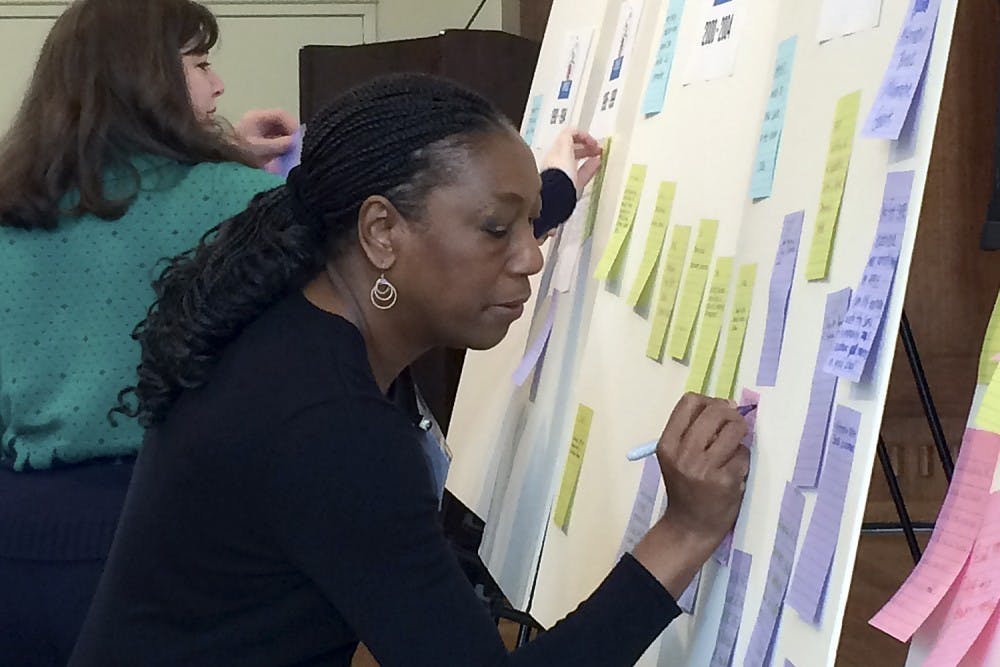“APPLES comes from the same traditions as the Campus Y — it grows out of the same roots,” he said. “It’s definitely where I learned and got my start in social justice issues and leadership training.”
Ulku-Steiner, Tony Deifell and Cindy Cheatham, among other supporters, created APPLES to prepare students to help with local agencies, Ulku-Steiner said.
“They’re just better volunteers; they’re more educated; they get the background and the context,” he said. “They’re more sensitive, more skilled. I had been connecting student volunteers to agencies; that’s how I got involved at the Student Y. It was really about taking the dots and trying to connect them.”
Cheatham credits APPLES for teaching her to find meaning in what she learns.
“The most important thing I learned was the appreciation of not just book learning but (that) practical experience and reflection can help you go deeper,” Cheatham said.
In the beginning, APPLES found support from professors, including the late Doris Betts and Sonja Stone as well as professors Joy Kasson, Peter Filene and Rachel Willis.
Willis, a faculty member in the Department of American Studies, spoke highly of her experience with APPLES student leaders.
“A couple of students came knocking on my door and asked, ‘We heard you’re a weird professor,’ — that was their opening line — and I said, ‘Yeah,’ and they said, ‘We have a weird idea, would you try it?’” Willis said. “And they described what service learning was, and I said, ‘Bring me something to read.’”
APPLES became a real entity on campus when students passed a referendum to increase student fees by 90 cents to fund APPLES indefinitely, Deifell said.
“I knew as soon as the elections were over that this thing was going to last. It was going to accumulate community partnerships. It was going to accumulate faculty allies. It was going to accumulate student leaders,” Deifell said.
“Because I was a student leader, I wanted to set it up in a way that was going to prioritize and lift up, protect the student leaderships.”
Leslie Parkins, who started working for APPLES in 2003, has been exposed to community service since a young age and to service learning since she worked at Miami University in Ohio.
To get the day's news and headlines in your inbox each morning, sign up for our email newsletters.
Throughout the years, the programs APPLES offers have grown tremendously thanks to private gifts and the office of the provost, said Parkins.
Parkins said APPLES needs to expand opportunities to include more students.
“With alternative breaks and internships, more than twice the number of people apply that can be accepted,” she said. “We aim to find innovative ways to offer more experiences for those students.”
Dorrier has made changes in the organization this year while keeping her eyes toward the future.
“I have shifted the focus this year to sustainable growth. Each committee created a five-year plan brainstorming how to grow APPLES programs in both depth and numbers. I also have started to look into fundraising as a source to fund this growth,” Dorrier said in an email.
“Additionally, I foresee APPLES having stronger connections with other organizations on campus. We have already started offering collaborative alternative breaks with other UNC organizations, and we partnered with the Campus Y this spring to put on two workshops.”
Jesse White, an APPLES alumnus, said working with the organization is a unique experience that keeps students coming back to volunteer.
“It brings real-world problems and situations into their learning environment. It teaches them in a way that really can’t be taught just from a lecture or from someone telling you the information,” White said.
Hannah Coletti, another APPLES alumna, said experiential learning is the reason why APPLES has had such success.
“I think it comes down to the fact that every experience that our students have with APPLES is so deep and meaningful, that it stays with them in a way that they don’t get in just a lecture or even a service experience that’s not connected with reflecting on how it affected their daily life back in their university community,” Colletti said.
Parkins said that APPLES seeks to reach out to more departments within the University and find new ways of funding the organization.
“There is always something growing with APPLES. I imagine we will have a lot to celebrate in another 25 years.”
Senior Writer Jane Wester contributed reporting
university@dailytarheel.com




